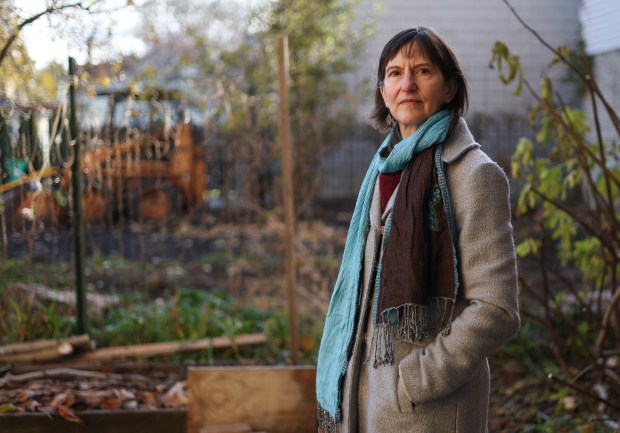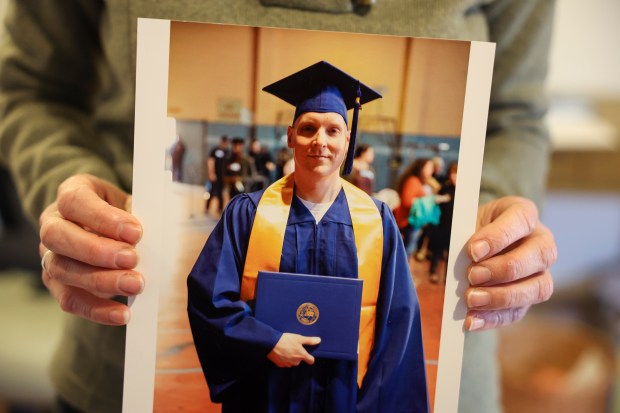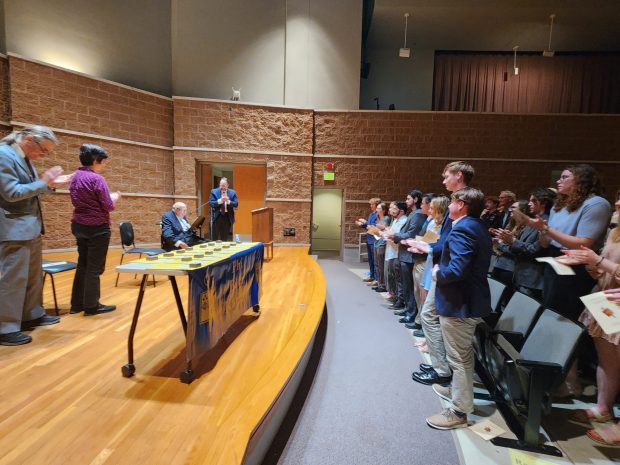For years, Lillian Bell says she hardly ever missed a Sunday visiting her son Michael in prison at Stateville Correctional Center.
The 70-year-old mother of three was grateful when Michael was transferred from a downstate prison to Stateville, near Joliet, when she had a heart attack. The family has remained close despite Michael’s decades in prison, and the hourlong drive to Stateville from her South Side home made it much easier for them to see each other in recent years, she said.
But as the state prepares to demolish and rebuild Stateville, inmates were moved to other prisons around the state. Michael Bell was transferred downstate to Lawrence Correctional Center in Sumner. It’s more than a four-hour drive from Chicago, and Lillian, who said she’s in remission for breast cancer, said she can’t make it on her own.
She hasn’t been to see him since he was moved to Lawrence. Michael Bell said he feels uncomfortable even asking his family to travel to see him at Lawrence, because he fears the long drive would be a waste of time if the prison was on lockdown or other circumstances prevented a visit.
“It’s really, it’s just so heartbreaking that I won’t be able to get to see him as much unless one of my boys take me,” Lillian Bell said.
Michael was even less optimistic: “I’ll probably never (see) my mom as long as I’m down here,” he wrote though a prison messaging service. “Simple and plain she can’t handle the trip.”
Bell was one of some 400 inmates transferred out of Stateville in September on a judge’s order after civil rights lawyers complained in a lawsuit that the aging maximum security facility was decrepit and unlivable. The state has started moving on a yearslong plan to rebuild Stateville and Logan women’s prison, which Gov. JB Pritzker and his administration say will be a major advancement in modernizing Illinois’ correctional system.
The state Capital Development Board last week announced it was starting to seek teams to oversee the construction for new prisons as part of the plan to rebuild Stateville and Logan. The state previously said the facilities would be two new multi-security-level prisons of 1,500 cells each, one for men and one for women.
Latoya Hughes, acting director at IDOC, in a statement said the announcement last week was a “crucial step forward in the Department’s mission to profoundly shift its approach to justice in Illinois.”
Some Stateville inmates from the Chicago area went to facilities that allowed them to continue in educational programs that for many have been life-changing. And some were shifted to facilities relatively close to Chicago — such as Sheridan, about 70 miles west of the city.
But others were transferred far downstate. Along with the distance, advocates have sounded the alarm on lapses in medical care and continuity in educational opportunities.
The American Federation of State, County and Municipal Employees Council 31, which represents workers at Stateville, has raised concerns of its own about what the prison’s temporary shutdown would mean for workers. The union on Oct. 1 reached an agreement on a process through which Stateville employees could take other jobs; however “there are still a number of steps to be completed before anyone will move to a new position,” spokesperson Anders Lindall said last month.
Stateville employees recently were temporarily filling vacant positions at the reception and classification centers on Stateville’s campus, Lindall said, and a few were working in positions unaffected by the rebuild such as the towers and gates.
Several inmates who have left Stateville said the conditions in their new facilities are, in fact, better than what they endured in the crumbling maximum security prison.
“Since Stateville Correctional Center had the worst physical living conditions of any facility in the state, we can’t help but to experience some better conditions,” Joseph Dole, who was transferred from Stateville to Pinckneyville Correctional Center — south of St. Louis — said in a written response to questions from the Tribune.
Dole said he had yet to see any of the vermin or physical structural problems at his new facility that he had come to know at Stateville. “Everyone’s life expectancy likely increased several years just by the fact that we were transferred out of Stateville,” he said.
But despite the squalid conditions, Stateville had one thing going for it: extensive programming for inmates that included academic offerings such as the Northwestern Prison Education Program, the Prison + Neighborhood Arts/Education Project and a music studio founded in collaboration with the rapper Common.

IDOC spokesperson Naomi Puzzello said that in transferring Stateville’s inmates, the agency tried to limit disruption to visitation and programming. But she added that no single prison could absorb all of the higher education programming offered by Stateville. In addition, “due to factors such as individual medical needs and security classifications, some individuals were not eligible to transfer to the same location as their program,” she said.
Despite the myriad complaints about Stateville, some who were housed there acknowledge it had advantages beyond its proximity to Chicago.
“When I went to Stateville, I got to attend college, I got my degree, I was (a teaching assistant in) classes, I was working in the studio, I was doing all these positive things,” Michael Bell said in a phone interview from Lawrence. “And because of where I came from early in my life, I had became an example to other people.”
Despite his incarceration, the family has been in near constant contact for decades, Bell’s mother said.
At Thanksgiving and Christmas dinners, Lillian Bell said, the family passes around a phone with Michael on the other end, so he can be a part of the festivities for as long as he can stay on the line. He has a tattoo that reads “MOM,” according to his publicly available IDOC profile.
And in-person visits have helped keep the family together over the years, she said.
“Those visits really did help with his morale, and it helped boost my spirits, because I could see him and know that he was OK,” she said.
Prison advocates have also raised concerns about inmates getting the proper medical care after moving to a new facility.
“When somebody has a medical issue, and their care is disrupted, it’s hugely problematic,” said Jennifer Vollen-Katz, executive director at the John Howard Association, a prison watchdog group. “There’s no excuse for that not to be the case.”
Some inmates also lost property in the transfer by IDOC, Vollen-Katz and some incarcerated people told the Tribune.
In its emailed response to questions about loss of property and medical care, IDOC said it takes the health and safety of incarcerated people “very seriously” and that oversight managers are currently overseeing grievances and responses. The department said it would work with “partners” at the John Howard Association to investigate the matter.
The disruption to the lives of individual inmates is happening with the goal of modernizing and rebuilding some of the most dilapidated prisons in Illinois: Stateville and Logan, a downstate women’s prison that remains open but is expected to most likely be rebuilt on the same campus as Stateville in Crest Hill.
“We’re frankly trying to do a better job as a state of managing corrections, and that’s the purpose that we announced, I don’t know, what is it, a year ago almost now,” Pritzker said last month, referring to the announcement that the two facilities would be rebuilt at an estimated cost of nearly $1 billion.
Bell, 52, has been incarcerated since the early 1990s after being convicted of murder, kidnapping, sexual assault and other crimes.
Since he arrived at Stateville, he said, he saw the culture change dramatically as more people took classes and took advantage of other opportunities, despite the poor physical conditions of the facility.
“When we left it was like a college campus where some of the same guys I had gang ties and conversations with had changed their lives and we were now having conversations about the 10 (page) paper we had to write, or debating about academic readings and what they meant to us,” Bell wrote in a message to the Tribune. “We were making our families proud and we were seeing ourselves in different lights.”
People were upset at having to move but were reassured programming and classes would be taken into account, Bell said — a consideration that ultimately didn’t pan out for some.
Participation in classes and other programming can contribute to inmates’ bids before the Prisoner Review Board.
IDOC said men from Stateville who want to move again will have an opportunity to request another transfer after three months, instead of the six months required under normal agency policy.
Both Bell and Dole said they would try to get to other facilities where they think they could resume participation in the programs they were involved with at Stateville.

Arianna Salgado, executive director of the Prison + Neighborhood Arts/Education Project, said she had specifically requested that 32 inmates, including Dole, be transferred from Stateville to Hill Correctional Center to continue participation in the program. Of those, only six ended up getting transferred to that facility, located about three hours southwest of Chicago, she said.
“That was really devastating for our kind of academic community,” Salgado said.
PNAP programming was also cut from six to seven classes meeting once a week prior to Stateville’s closure, to three classes meeting monthly now at Hill.
Dole said the move means his family, some of whom live in Michigan, “can no longer visit in person unless they spend 13 hours in a car each way, and spend about $1,000 on gas, food, and a hotel room.”
The move also disrupted his teacher’s assistant job at Stateville, through which he said he was making about $1,500 a semester, “good money” that “could be going to my daughters’ Christmas gifts, my grandson’s Christmas gifts, my legal fees.”
The 48-year-old has been incarcerated for more than two decades on convictions of murder, kidnapping and battery.
Shari Stone-Mediatore, who met Dole through his prison academic work and has collaborated with him on research about correctional issues, said she used to visit him in-person about once a month when he was in Stateville and she was in Chicago, between stints living in Ohio.
“I’m never going to visit him at Pinckneyville,” Stone-Mediatore, a professor of philosophy and humanities at Ohio Wesleyan University, said on the phone last week. “I just don’t have the time.”
Even phone visits are harder to come by at some facilities other than Stateville, because of lockdowns and other restrictions, incarcerated people and their advocates told the Tribune.
Demetrice “DC” Crite, 54, who has been incarcerated for more than two decades on convictions of sexual assault, was transferred from Stateville to Danville Correctional Center, about three hours south of Chicago. He said inmates have safer conditions at Danville, but was concerned about how the move would affect his efforts to apply to law school from prison.
While trying to figure that out, he’s found at least one program at Danville he’s interested in: an English as a Second Language peer teaching program run through the University of Illinois Education Justice Project.
“My education,” he said, “is really what my freedom hinges on.”




